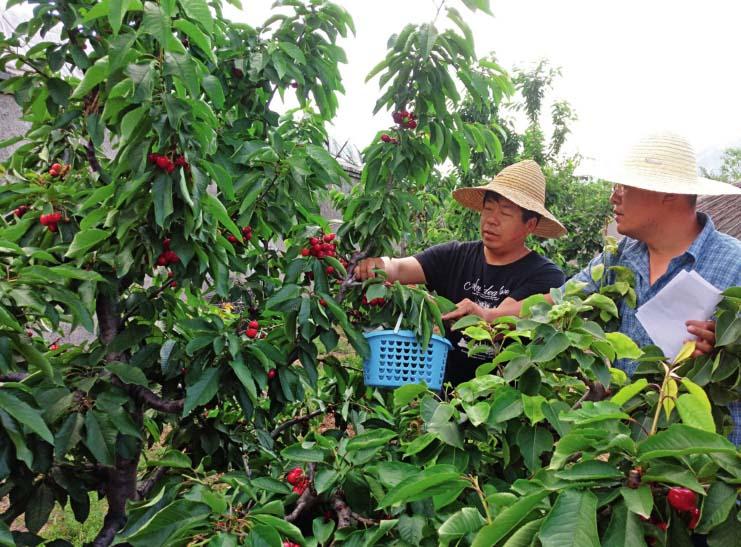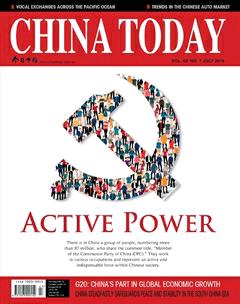Li Liang:First Secretary from Beijing
By staff reporter LIU YI

LI Liang was appointed first Party secretary of Beizhuang Village, Liucun Town of Changping District, Beijing, in November 2015.
He is among the first batch of more than 200 officials that the Beijing municipal government selected last November and sent to work in povertystricken villages. The campaign calls on young officials accustomed to a comfortable, air-conditioned working environment to go to the countryside. There they are expected to acquaint themselves with village life and make development-related suggestions to local residents.
Li Liang, who is in his early 30s, is a standard urbanite with little experience of either living or working in the countryside. Formerly a TV news reporter, four years ago he was recruited to the Beijing Municipal Committee of the Chinese Peoples Political Consultative Conference (CPPCC).
Join the Village Circle
Beizhuang is a village of 93 households and 182 people in Beijings northwestern suburbs. Li Liang left his downtown home one Monday morning in November, 2015 at 6 am, and boarded the S2 commuter train to Nankou, Changping. He then took the 10 km bus ride to the village where he would live and work for the next two years.
Both his old and new work units, as well as the Beizhuang villagers, had high expectations of this energetic young man. But Li felt he should first of all try to discard his image as an outsider and become regarded as a fellow villager.
Lis mentor, Deputy Party Secretary of Liucun Town Xu Guangjun, explained to Li local conditions. Beizhuang Village Party Secretary Zhang Honghai is also a great source of information about the village.
Lis experience as a veteran reporter helped him to rapidly grasp the demands of his new job. During the first two months he walked around and“interviewed” almost everyone he ran into, whether at work in the fields and greenhouses, at home in the village, or at the town government offices. His list of WeChat friends thus grew, and the workings of the village became clearer to him.
Village Brand Building
Beizhuang Village connects the plain where the city proper is located with the mountainous region extending northward. Although only 50 km away from downtown Beijing, the village has yet to develop and so exploit this geographic advantage.
Rural residents are unfamiliar with the concepts of branding and publicity, and consequently with their potential value. To their minds only people doing business need branding, so how could it be applied to a village?
Li constantly stresses to the village committee members the importance of branding, telling them, “If you want to prosper you need to make yourself known.” He believes a good logo is vital in order to promote the villages image and expand its market. Drawing on media resources, he helped to design the Beizhuang logo which appears on the packaging of all the villages agricultural products. To Li, the logo also highlights the villages identity, and so strengthens its residents sense of cohesion and pride.
Beizhuang is a pilot base for cultivating edible lilies. However its greenhouses are usually empty during the winter slack season. Villagers might use them to plant organic leafy vegetables for family consumption, but any surplus would be thrown away.
Li Liang, however, knowing how much urbanites relish green vegetables, tried a little experimental marketing with his former colleagues. The results exceeded his expectations. In March this year, Li and two farmers drove a truck loaded with fresh agricultural products to the office of the Beijing CPPCC Committee. All the vegetables, honey, lilies, and free-range eggs sold out within two hours. On April 22 Li again led his villagers to the office to sell Chinese toon leaves, a popular spring vegetable. His colleagues there bought the entire crop, generating sales worth RMB 5000. Beizhuang residents now realize, “The Chinese toon is commonplace in our village, but to city dwellers it is a rare treat.” It is therefore a reliable source of profit.
Guardian of Safety and Happiness
The 2016 Spring Festival was the first Li Liang spent away from his wife and six-year-old son. Instead he celebrated it in the village.
As early as a month beforehand, Li attended the meeting of the town government about security during the festival. This was the first time he heard the saying, “Villagers have the New Year feast, but officials take a test.” All town and village leaders needed to be ready to deal with any unexpected situations or accidents.
Every day Li Liang and his colleagues led the villagers patrol team to inspect potential trouble spots, such as piles of firewood. They maintained vigilance right through to the eve of the festival. This was the first time Li watched the Lunar New Year fireworks alone, but felt it worthwhile as his efforts prevented any possible thefts or outbreaks of fire in the village.
Before he came to work in the vil- lage, Li had heard another saying, “The village official is a basket that carries everything.” He wasnt sure exactly what it meant until one day a senior villager surnamed Tang came to him with an awkward problem. It concerned uncertainty about the boundary between the family cemetery and the farmland his daughters son had contracted. It was then that Li understood the meaning of that saying. Knowing little about how farmland is subdivided, how the related laws work, or what family ethics entail in the countryside, Li invited Tang and his grandson to the office for a face-toface talk on the situation. He also invited officials from the legal department along to explain the relevant laws and policies. The two sides eventually worked out a preliminary solution through mediation.
More than six months have passed since Li Liang started working in Beizhuang Village. He is conscious of the considerable gap between the village and the city, even though they are only 50 km apart. It is an income and lifestyle gap, and also one of ideas and knowledge. Li accordingly mobilized his former colleagues to donate books to Beizhuang, and so amassed about 1,000 in just a few days. They include textbooks for children, books on health for seniors, and volumes on agricultural technology. With their help, Li Liang believes he can narrow the urban-rural gap before too long.

